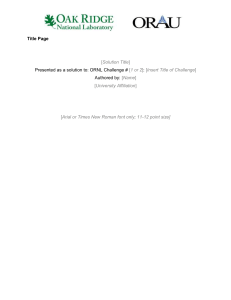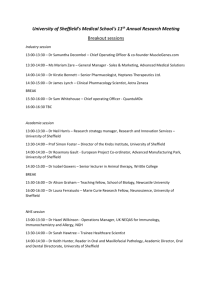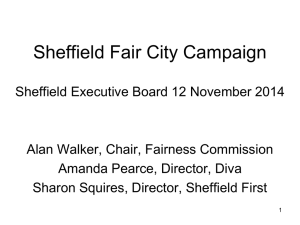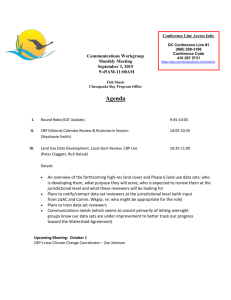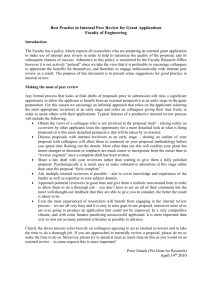Internal Grant Review System
advertisement
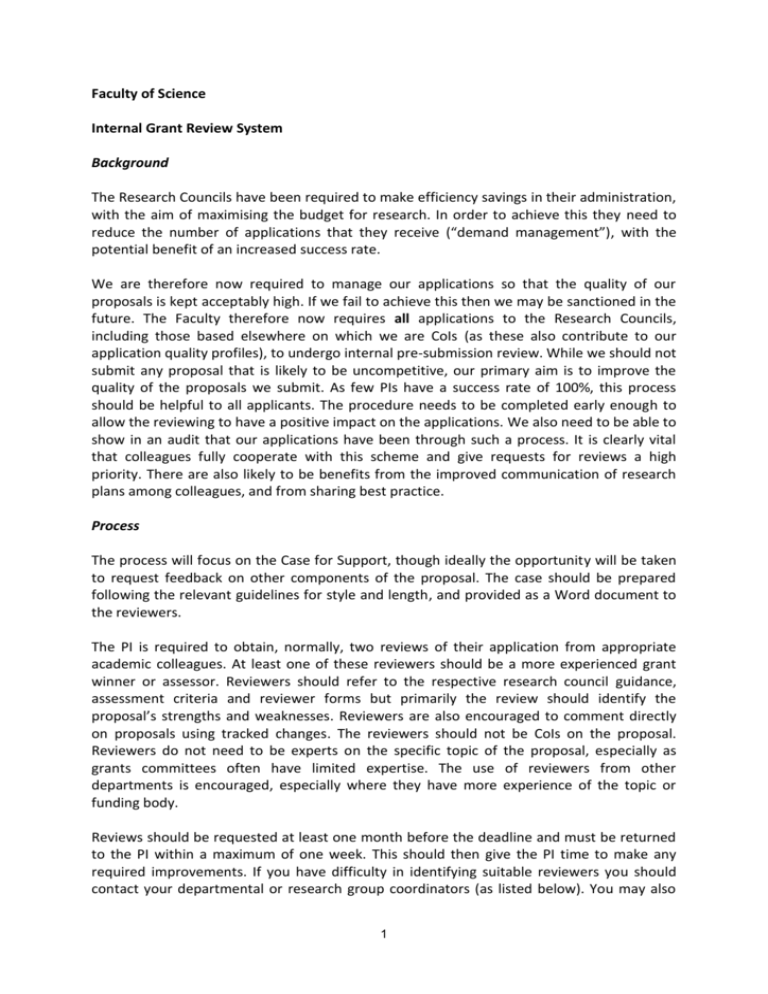
Faculty of Science Internal Grant Review System Background The Research Councils have been required to make efficiency savings in their administration, with the aim of maximising the budget for research. In order to achieve this they need to reduce the number of applications that they receive (“demand management”), with the potential benefit of an increased success rate. We are therefore now required to manage our applications so that the quality of our proposals is kept acceptably high. If we fail to achieve this then we may be sanctioned in the future. The Faculty therefore now requires all applications to the Research Councils, including those based elsewhere on which we are CoIs (as these also contribute to our application quality profiles), to undergo internal pre-submission review. While we should not submit any proposal that is likely to be uncompetitive, our primary aim is to improve the quality of the proposals we submit. As few PIs have a success rate of 100%, this process should be helpful to all applicants. The procedure needs to be completed early enough to allow the reviewing to have a positive impact on the applications. We also need to be able to show in an audit that our applications have been through such a process. It is clearly vital that colleagues fully cooperate with this scheme and give requests for reviews a high priority. There are also likely to be benefits from the improved communication of research plans among colleagues, and from sharing best practice. Process The process will focus on the Case for Support, though ideally the opportunity will be taken to request feedback on other components of the proposal. The case should be prepared following the relevant guidelines for style and length, and provided as a Word document to the reviewers. The PI is required to obtain, normally, two reviews of their application from appropriate academic colleagues. At least one of these reviewers should be a more experienced grant winner or assessor. Reviewers should refer to the respective research council guidance, assessment criteria and reviewer forms but primarily the review should identify the proposal’s strengths and weaknesses. Reviewers are also encouraged to comment directly on proposals using tracked changes. The reviewers should not be CoIs on the proposal. Reviewers do not need to be experts on the specific topic of the proposal, especially as grants committees often have limited expertise. The use of reviewers from other departments is encouraged, especially where they have more experience of the topic or funding body. Reviews should be requested at least one month before the deadline and must be returned to the PI within a maximum of one week. This should then give the PI time to make any required improvements. If you have difficulty in identifying suitable reviewers you should contact your departmental or research group coordinators (as listed below). You may also 1 find it helpful to consult with current and recent members of Research Council panels (see separate document on the Faculty Peer Review System webpages – “funder panels and boards”). The PI should then email the following information, the application and the two reviews to the HoD, or HoD’s nominee, via the email address shown below. Copies of these emails should be retained within the department so that they are available for audit. Title of proposal: Lead PI: Co-PIs: Funding body: Submission deadline: I confirm that the above grant has been subject to an internal review and feedback by: Reviewer 1: Reviewer 2: Date: The HoD will then indicate to the PI whether they will support the proposal (i) as written, (ii) support it subject to revision, or (iii) not support it. In the case of (ii), a record should be kept of how the proposal was revised – the PI should email this with the revised case to the HoD or HoD’s nominee, as above, prior to formal submission. This process is required for all RCUK applications, though its use to improve the quality of other applications is encouraged. Please send updates of coordinator details and panel memberships to Chris Smith (c.p.smith@sheffield.ac.uk). Addresses for submitting proposals to HoDs/ Nominees APS BMS – CDBG, CSCB, CMIAD BMS – other Chemistry MBB Physics Psychology SoMaS hodaps@sheffield.ac.uk Relevant Centre Director (see below) hodbms@sheffield.ac.uk ch-hod@shef.ac.uk hod.mbb@sheffield.ac.uk n.clarke@sheffield.ac.uk p.g.overton@sheffield.ac.uk Somas-hos@sheffield.ac.uk Departmental/ Research Group Coordinators APS Ecology & Environment Evolution & Behaviour Plant & Microbial Biology Rob Freckleton Roger Butlin Andrew Fleming 2 Mark Rees Jon Slate Jonathan Leake BMS Chemistry MBB Physics Psychology SoMaS CMIAD Liz Smythe CSCB Peter Andrews CDBG Phil Ingham Physiology/ Neuroscience David Grundy Chemical Biology Chris Hunter Polymers, Materials & Steve Armes Surfaces Synthesis (& Catalysis) Mike Ward Theory & Spectroscopy Patrick Fowler TBC Particle Physics Neil Spooner Astrophysics Clive Tadhunter Inorganic nanostructures Maurice Skolnick Polymers, soft condensed David Lidzey matter Paschal Sheeran (DRI) in all instances Algebra David Jordan Fluid Dynamic Koji Ohkitani Environment, Biology Control Number Theory Probability & Statistics Solar Physics & Nick Monk Topology, Geometry Categories & Sarah Whitehouse Tobias Berger Jeremy Oakley Michael Ruderman 3 Kathryn Ayscough Harry Moore Marysia Placzek Matthew Holley Robert von Siebenburgen Shaun Quegan John Biggins Robert von Siebenburgen John Greenlees Fay- Fay-
